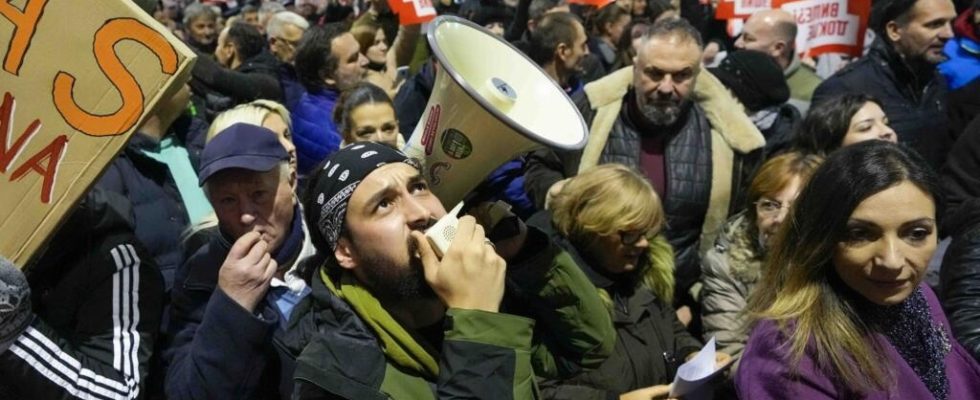3 mins
Since the elections of December 17, marred by very strong suspicions of fraud, the protest against the regime of Aleksandar Vučić has widened. On the evening of Sunday, December 24, thousands of people gathered to denounce electoral fraud. Of violent incidents erupted in front of Belgrade town hall. The next day, thousands of students demonstrated against this violent repression, blocking several streets in Belgrade. Russia evokes a “attempt to destabilize abroad”. But can Aleksandar Vučić’s regime really falter? ?
While thousands of young people demonstrate for democracy in the streets of Belgrade, others cheer Vojislav Šešelj or Ratko Mladić. How did Serbian youth get there? The writer Vladimir Arsenijević evokes this “ terrifying generation “.
A ” step forward » ?
Meanwhile, Belgrade decided to authorize the entry into its territory of vehicles registered “RKS”, putting an end to a long conflict. If Brussels welcomes a “ step forward “, Serbs in northern Kosovo are divided. Pristina is waiting to see before applying reciprocity.
A ” honorary recycling »
Having become cumbersome in Belgrade, the former head of the secret services Aleksandar Vulin will be the subject of a “ honorary recycling “, in joining the Senate of the Republika Srpska of Bosnia and Herzegovina. There he will rub shoulders with the former bishop Kačavenda, dismissed for a sex scandal, or the filmmaker Emir Kusturica.
Towards an arrest of Edi Rama?
In Albania, Parliament voted the lifting of immunity of former Prime Minister and opposition leader, Sali Berisha. The decision, requested by Edi Rama’s Socialist Party, paves the way for his possible arrest as part of a corruption investigation.
Bribery and influence peddling
A series of investigations reveals the underside of financing of the powerful Romanian Orthodox Church, which receives millions of euros of public money each year for the remuneration of priests and the construction and maintenance of churches. THE Orthodox churches in the Balkans still maintain too close links with nationalism and the political sphere.
“ If you don’t know, ask your grandfather »
In Montenegro, it is always popular to talk about “traditional values”. Yet, these values were largely set during the communist era. Montenegro before 1945 has little to do with the discourse of today’s traditionalists.
“ The Trojan Women » hasn’t aged a bit
On November 23, the Dodona Theater in Pristina, Kosovo, hosted the premiere of Trojan Women – Replica, an adaptation of the Greek tragedy by Euripides, written by Shpëtim Selmani and directed by Kosovar Zana Hoxha and Serbian Dijana Milošević. An artistic project that offers a feminist look at war and peacein the Balkans and beyond.
A work that denounces feminicide causes a scandal
On display at the New York consulate in Greece, a Greek flag revisited in pink by the artist Georgia Lale in tribute to victims of domestic violence has been removed at the request of the Greek Ministry of Foreign Affairs.
► A press review presented in partnership with The Balkan Courier
